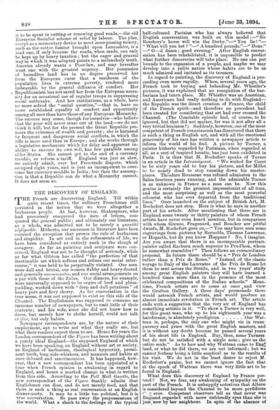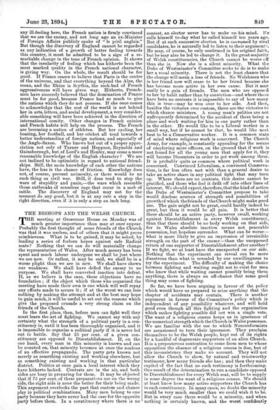THE DISCOVERY OF ENGLAND. T HE French are discovering England. Till
within quite recent times, the ordinary Frenchman still persisted in the notion that we were altogether a barbarous people. At last, however, Shakespeare, who had previously conquered the men of letters, con- quered the general public ; and ultimately our literature, as a whole, was admitted not to be merely a guantite njgligeable. Hitherto, our successes in literature have been counted the exception that proves the rule of barbarism and stupidity. In art and in the refinements of life, we have been considered as entirely sunk in the slough of savagery. As far as painting and sculpture were con- cerned, England was not to be thought of seriously, while as for what Gibbon has called "the perfection of that inestimable art which softens and refines our social inter- course," it was held to be perpetually violated. Our men were dull and brutal, our women flabby and heavy-footed and generally assommantes, and our social arrangements on a par with those of the Zulus. Our dinners, for example, were universally supposed to be orgies of beef and plum- pudding, washed down with "deep and dull potations" of heavy port and fiery sherry. As for conversation in the true sense, it was not supposed to exist on this side of the Channel. The Englishman was supposed to consume an immense number of newspapers, but to emit little of their .contents ; and his wife, since she did not know how to dress, but merely how to clothe herself, could not talk chTon, but only babies. Newspaper correspondents are, by the nature of their employment, apt to write not what they really see, but what their readers expect them to see. Hence for years the London correspondent of the Figaro has been writing about a purely ideal England—the supposed England of which we have been speaking, an England without art or society, an England of barbarism, theological hypocrisy, promi- nent teeth, long side-whiskers, and manners and habits at once debased and sanctimonious. It has happened, how- ever, that a new correspondent has been appointed at a time when French opinion is awakening in regard to England, and hence a marked change in what is written from this side. According to the Pall Mall Gazette, the new correspondent of the Figaro frankly admits that Englishmen can dine, and do not merely feed, and that there is such a thing as real conversation at an English dinner-party. It may be a little too political, but it is true conversation. So pass away the prepossessions of the world. What a shock to the feelings of the typical half-cultured Parisian who has always believed that English conversation was built on this model :—" Sir Rosebery's horse will win the Derby."—" You lie ! "— " What will you bet ? "—" A hundred pounds."—" Done." —" G—d damn ; good evening." After English conver- sation has been rehabilitated, it is impossible to predict what further discoveries will take place. No one can put bounds to the expansion of a people, and maybe we may develop into a polite nation whose habits are to be as much admired and imitated as its trousers.
In regard to painting, the discovery of England is pro- ceeding even more rapidly. When, several years ago, the French took to buying and belauding Mr. Whistler's pictures, it was explained that no recognition of the bar- barians had taken place. Mr. Whistler was an American, and Americans had really nothing to do with England— the Republic was the direct creation of France, the child of the French spirit—and therefore no precedent had been created for considering that art had ever crossed the Channel. (The Constable episode had, of course, to be ignored, but that did not matter, for was it not after all a very trivial business ?) Suddenly, however, one of the most competent of French connoisseurs has discovered that there is such a thing as English art, and with all the emotional generosity of his race has written a newspaper article to inform the world of his find. A picture by Turner, a painter hitherto regarded by Parisians, when regarded at all, as a sort of inspired lunatic, has just been exhibited in Paris. It is thus that M. Rochefort speaks of Turner in an article in the Intransigeant. "We waited for Corot to be sixty years old to buy his picture, and for Millet to be nearly dead to stop running down his master- pieces. Theodore Rousseau was refused admission to the Salon fourteen years running, and the admirable Turner is as unknown in France as a man can be. Now this. genius is certainly the greatest impressionist of all time, and the most surprising as well as the most powerful colourist who has ever departed from the traditional lines." Once launched on the subject of British Art, M. Rochefort does not stop. Here is what he says in another part of his article. After mentioning that there are in England some twenty or thirty painters of whom French artists have never even heard mention, but in comparison with whom Greuze, Fragonard, and Boucher are pitiful dwarfs, M. Rochefort goes on,—" You may have seen some engravings from pictures by Reynolds, Thomas Lawrence, or Hogarth, but do you know Hoppner ? No, I imagine. Are you aware that there is an incomparable portrait- painter called Raeburn much superior to Prud'hon, whom he somewhat resembles?" Then follows an extraordinary proposal. In future there should be a "Prix de Londres rather than a Prix de Rome." "Instead of the classic voyage to Italy of the Laureates of the Prix de Rome let them be sent across the Straits, and in two years' study among great English painters they will have learned a hundred times more than in the presence of the most celebrated compositions of the Italian schools." Mean- time, French artists are to come at once .and view the Grafton Gallery. A three days' promenade there would astonish French artists, and would produce an almost immediate revolution in French art. The article ends with a suggestion that the very air of England has something artistic in it. "To show a Turner is very well, for this great man, who up to his eighteenth year was a hairdresser, is absolutely prodigious Our Wat- teau is, perhaps, the only one who might vie in trans- parency and grace with the great English masters, and it is without any doubt because he passed several years of his short life in England. Buy, then, some Turners but do not be satisfied with a single note ; give us the entire scale." As to how and why Watteau came to Eng; land, or what he did there, we are not informed ; but we cannot forbear being a little sceptical as to the results of his visit. We do not in the least desire to reject M. Rochefort's praise, but we cannot ignore the fact that at the epoch of Watteau there was very little art to be found in England.
What does this discovery of England by France por- tend? Not, we fear, any awakening of sympathy on the part of the French. It is unhappily notorious that Albion is considered beyond the Channel to be more perfidious t'- 7 ever. Competent observers tell us that never was England regarded with more unfriendly eyes than she is just now by her neighbour. In spite of the absence of any ill-feeling here, the French nation is firmly convinced that we are the enemy, and not long ago an ex-Minister of Foreign Affairs publicly spoke of "le petil anglais." But though the discovery of England cannot be regarded as any indication of a growth of better feeling towards this country, it must be admitted to be a sign of a re- markable change in the tone of French opinion. It shows that the insularity of feeling which has hitherto been the most marked quality in the French national character, is giving way. On the whole, the result should be for good. If France ceases to believe that Paris is the centre of the universe, and that everything beyond the Alps, the ocean, and the Rhine is Scythia, the rock-bed of French aggressiveness will have given way. Hitherto, French- men have sincerely believed that the domination of France must be for good, because France had so much to give the nations which they do not possess. If she once comes to acknowledge that the rest of the world is not behind her in arts, letters, and social development, a very consider- able something will have been achieved in the direction of international comity. Other changes in French opinion and French habits will help on the process. The French are becoming a nation of athletes. But her cycling, her boating, her football, and her cricket all tend towards a better understanding of foreign nations, and especially of the Anglo-Saxon. Who knows but out of a proper appre- ciation not only of Turner and Hoppner, Reynolds and Gainsborough, but of Lord's and Henley, may come a more reasonable knowledge of the English character ? We are not inclined to be optimistic in regard to national friend- ships. Still, the more knowledge of each other the nations have, the less is the chance of friction. Knowledge does not, of course, prevent animosity, or there would be no such thing as civil war. Still, it does tend to stop the wars of stupidity and panic,—the wars which resemble those outbreaks of senseless rage that occur in a mob of cattle. The discovery of England may not for the moment do any good, but it is at any rate a step in the right direction, even if t is only a step an inch long.



































 Previous page
Previous page